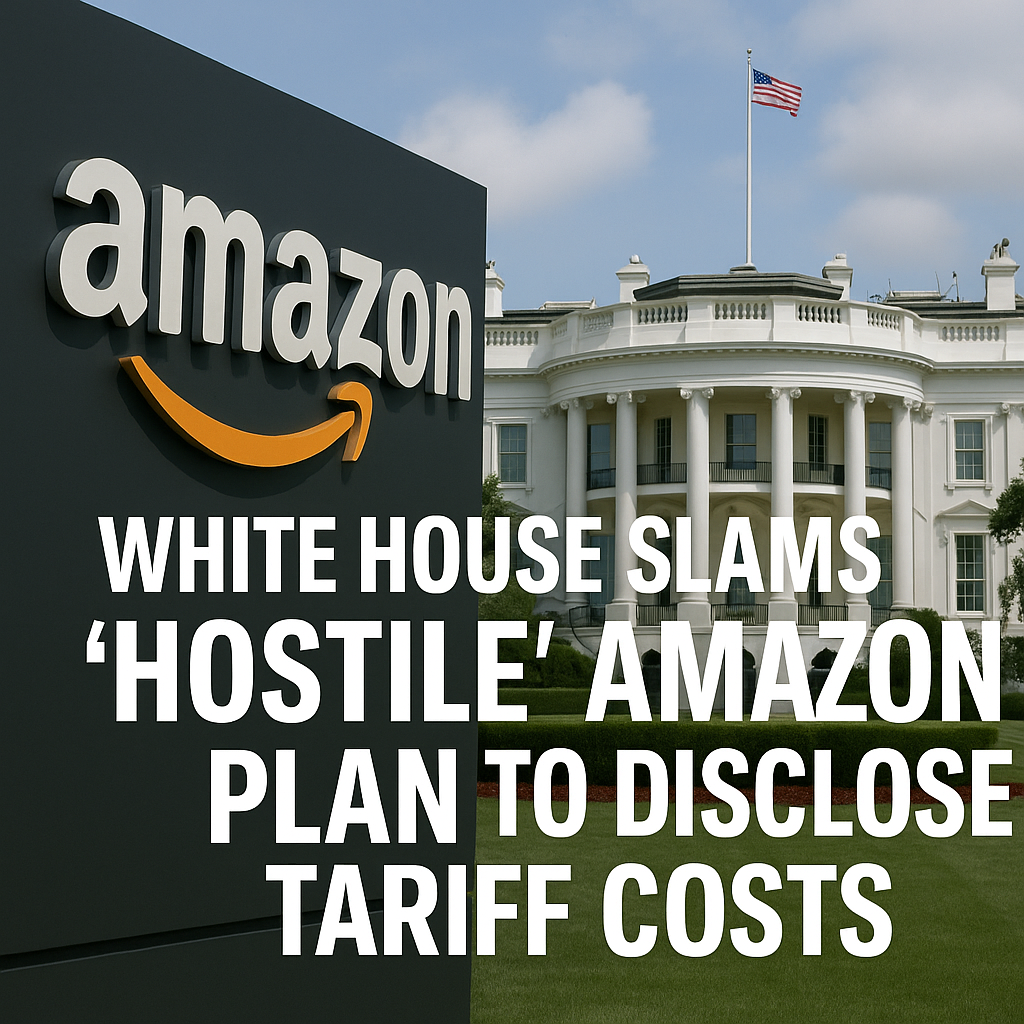Amazon Faces Backlash from the White House Over Tariff Impact Disclosure
In a significant development, the White House has retaliated against Amazon for allegedly preparing to notify its customers about the potential impact of former President Donald Trump’s trade tariffs on product costs. Amazon’s action was characterized as “hostile” and politically motivated by the Biden administration.
In order to compete with up-and-coming e-commerce companies like Shein and Temu, Amazon apparently thought about disclosing pricing details for Amazon Haul, its low-cost shopping platform that was introduced in the United States last year. The business, however, denied that it had any plans to apply this change to its main e-commerce website.
Even with Amazon’s explanation, the White House’s choice to publicly address the report shows how much pressure it is under due to the recently imposed import taxes. According to economic specialists, these tariffs may raise consumer costs and increase the likelihood of a recession.
Labels from the White House Amazon’s Action as a Political
White House Press Secretary Karoline Leavitt discussed the topic at a press briefing on President Trump’s 100th day in office. She claimed to have spoken with the President about Amazon’s alleged plan and that it provides even more argument for why Americans should give preference to purchasing goods created in the United States.
“Amazon is engaging in a hostile and political maneuver,” Leavitt said. When the Biden administration caused inflation to reach a 40-year high, why did Amazon do nothing? Why now?
The administration’s assumption that Amazon’s strategy is more political signaling than real customer concern is reflected in this audacious statement. It also highlights the tight and erratic relationship that has existed between the tech behemoth and former President Trump.
Tariffs and Their Effects on the Economy
Trump has raised tariffs dramatically since taking office again in January, claiming that the actions will improve American manufacturing and increase the nation’s tax revenue. Even though certain tariffs were somewhat lowered this month, many imports from overseas are still subject to at least a 10% levy under Trump’s updated trade policy, and for Chinese goods, that amount can reach 145%.
Trade between the US and a number of nations, most notably China, has already begun to decline as a result of these new tariffs. China is a significant producer of products like umbrellas and baby strollers, so worries about possible shortages and price increases for commonplace things are mounting.
The market may be affected by these interruptions, raising consumer costs and even escalating economic instability, according to economists.
The Wider View: Political Tensions, China, and Amazon
U.S. Treasury Secretary Scott Besant reminded the public that the United States is still negotiating trade with many of its key allies and defended the government’s economic performance on Tuesday. He did not, however, respond to inquiries about whether China is one of the nations presently negotiating with Washington.
This hesitancy has drawn criticism, especially as China continues to be the third-largest import source for the United States, after Mexico and the European Union.
Online retailers have already started to analyze the impact of the additional tariffs on product prices. Temu and Shein, for instance, have alerted consumers to impending price hikes brought on by increased import taxes. The problem is particularly pertinent to Amazon because, according to analysts, almost half of all vendors on the U.S. marketplace are Chinese.
Amazon’s Approach and Quietness
Punchbowl News, citing an unnamed source, was the first to report about Amazon’s tariff disclosure strategy. The BBC contacted Amazon for comment, but Amazon did not reply.
Despite this quiet, it is evident that Amazon is carefully analyzing its options and balancing its business interests with the political environment at the moment.
The relationship between Trump and Jeff Bezos, the founder of Amazon and owner of The Washington Post, has been complex. Bezos met with Trump following the 2016 election and endorsed his tax changes and deregulatory program. Bezos was given an honored seat at the Trump inauguration, and Amazon even contributed financially to the occasion.
But the two men’s frequent arguments overshadowed those times of cooperation. Trump frequently attacked Amazon and The Washington Post throughout his first administration, charging them with political bias and unscrupulous business practices. Using one of his Blue Origin rockets, Bezos jokingly joked about sending the former president into space. Bezos also accused Trump of making remarks that were detrimental to American democracy.
Court Cases and Allegations of Prejudice
When Amazon sued the Pentagon in 2019, claiming that Trump had inappropriately influenced a decision to deny the corporation a $10 billion cloud computing contract, the rivalry reached a legal peak. The lawsuit contended that what ought to have been an unbiased bidding process had been impacted by Trump’s personal hostility toward Bezos.
Amazon argued that Trump’s intention to punish a perceived political adversary was the reason behind the contract loss rather than any merit.
The White House’s response to Amazon’s alleged tariff disclosure plans suggests that these tensions still exist today. Regardless of whether Amazon moves forward with the plan, the episode emphasizes the precarious equilibrium between American political power and digital giants—as well as the expanding impact of trade policy on consumer behavior.
Concluding remarks
The dispute around Amazon and the tariffs imposed by the Trump administration is merely the most recent development in a larger story about how politics, business, and global supply networks interact. Businesses and consumers will have to negotiate a more complicated and politically heated economic environment as import taxes increase and trade relations become more strained.
This won’t be the last time we see a significant internet business caught in the crossfire of political objectives, as e-commerce platforms are under pressure to maintain transparency while also safeguarding their corporate interests.
